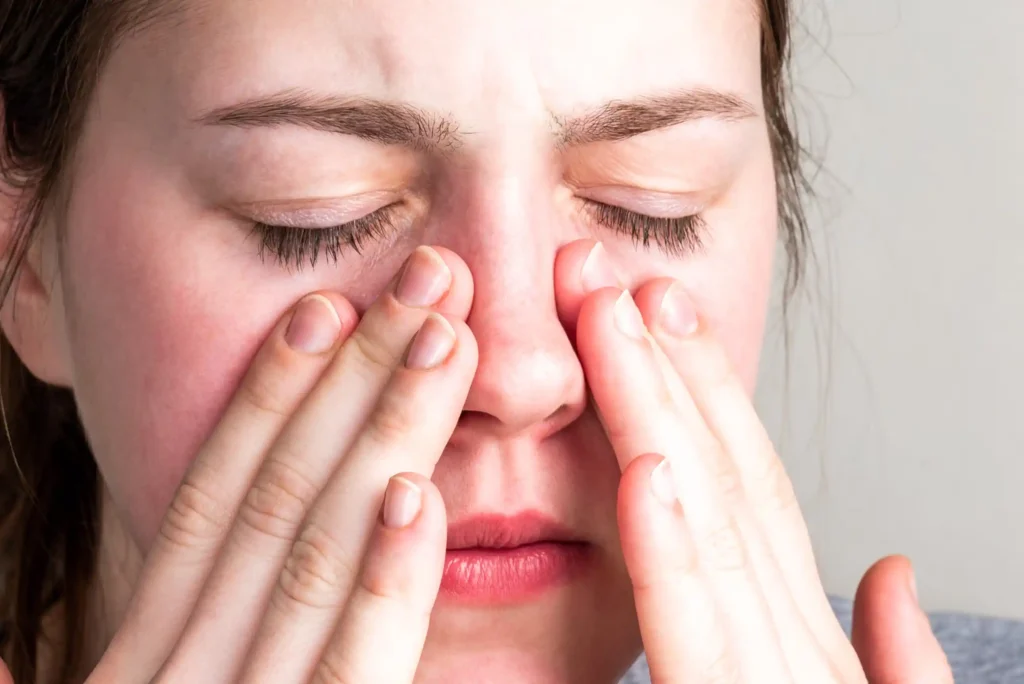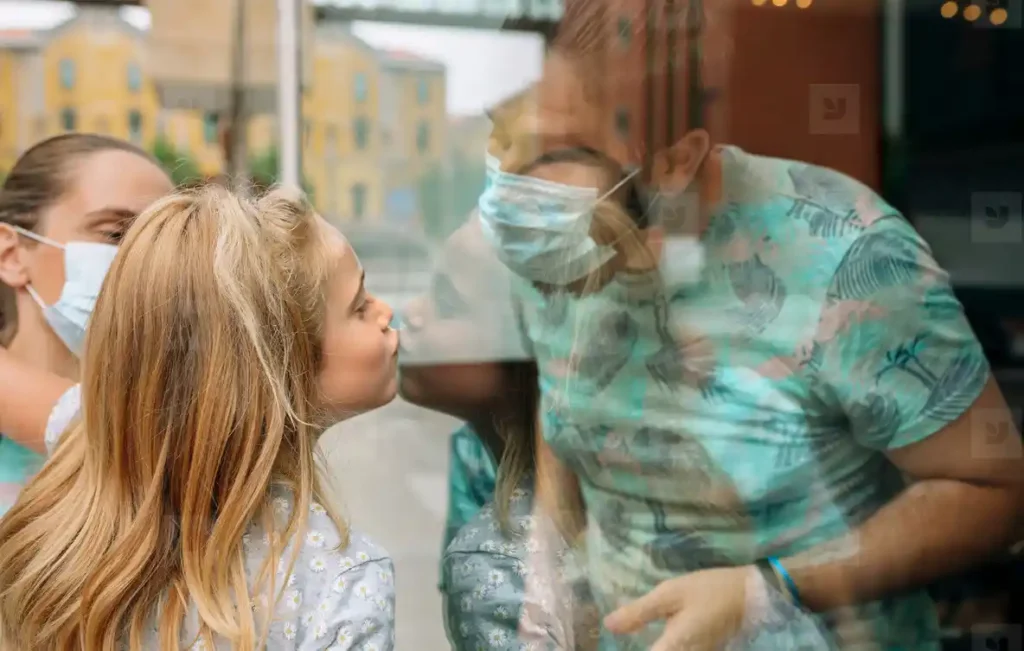Are you also having a stuffy nose and constant headache along with pressure like sensation on face? Sinus infections can really make you miserable like that. Sometimes, you even start worrying if you can pass it on to others. It’s a common question, and it’s something we all think about in this situation. because honestly no one wants to be that person who’s spreading germs everywhere.
Sinusitis isn’t always contagious; however, the virus or bacteria that are responsible for it can spread. If your infection in the sinuses began after catching a cold, it’s most probably viral, so you can pass it to others. On the other hand, the chances are relatively low if your infection is bacterial. Still, you should be cautious as the initial viral infection that later advances to the bacterial one can be contagious.
So, how do you know what’s safe? Whether you wanna go back to work or hang out with friends, we’ve got the information just so you can make a wise decision for you and those around you.
What Is a Sinus Infection?
Sinuses are basically air-filled cavities in your skull and their infection occurs when they become inflamed and swollen. This inflammation can block the flow of mucus and you may consequently experience pain . You can also feel a pressure-like sensation because of the buildup of bacteria or viruses.
How Does a Sinus Infection Spread?
A sinus infection especially if you have viral ones spreads just like any other cold or flu. It’s primarily spread through:
- Coughing and sneezing: When someone with an infection in the sinuses sneezes or coughs, they release tiny droplets containing the virus or bacteria into the air . The result is that you can catch the infection by breathing these in.
- Direct contact: Let’s say you touch surfaces that have the virus or bacteria on them and then touch your face particularly your nose or mouth region, you can get an infection in this case too.
- Close contact: You can also increase the chances of having an infection when you’re close to someone who’s sick and they’re not taking precautions.

Symptoms of a Sinus Infection
The symptoms of an infection in the sinuses are distinct and can range from mild to severe. Still, you can experience these major signs:
- Facial pain or pressure: A constant feeling of pressure behind the eyes or in the cheeks.
- Congestion: A stuffy nose that doesn’t improve even after some time.
- Thick nasal discharge: Yellow or green mucus that doesn’t clear up.
- Headaches: It is often because of the pressure in the sinuses.
- Coughing: Specifically occurs at night when mucus drains down your throat.
- Fatigue: You feel exhausted with the ongoing discomfort.
- Fever: A mild fever may accompany a sinusitis, especially if it’s bacterial.
If these symptoms last longer than 10 days or worsen, that’s the point where professional care becomes a necessity. Contact Novamed Urgent Care to get a proper checkup as well as treatment.
Read More : Can a Sinus Infection Cause Dizziness?

How Long Is a Sinusitis Contagious?
If your infection is viral, you can spread it to others from the moment symptoms appear and will remain contagious for the first 3 to 7 days. After that, the risk of spreading the virus drops to a great extent. If it’s bacterial, chances are extremely less that it’ll spread. Still, it can carry some risk, especially if you’re coughing or sneezing.
Treatment Options for Sinus Infections
The treatment for sinus infection strictly depends on its cause. For viral infections, over-the-counter remedies and home care are often enough. Whereas antibiotics may be necessary for bacterial infections. Let’s break down the options:
Viral Sinus Infections
Viral infections are the most common cause and mostly go away on their own over time. You’ll get the most benefit from rest and hydration along with using nasal saline sprays. These are the first steps to relieve congestion and clear mucus. You can also take decongestants and pain relievers to reduce discomfort other than easing inflammation. Indeed, these remedies may not cure your infection completely. However, they can manage your symptoms so you can be more comfortable during your body’s healing phase.
Bacterial Sinus Infections
If you’ve gotten a bacterial infection and your symptoms don’t improve even after 10 days or become severe. In such a situation, antibiotics might be necessary. Your doctor will most probably prescribe antibiotics to clear the infection quickly. However, antibiotics are only effective for bacterial infections. Therefore, you must confirm with your healthcare provider before you start your medication.
Chronic Sinusitis
Suffer from chronic infections for more than 12 weeks? Our healthcare professionals will provide you with more targeted treatments for this condition. For instance, we may include nasal corticosteroids to decrease inflammation. For more severe cases, we’ll have to perform surgery to clear blocked sinuses and improve drainage. These treatments basically address long-term issues in addition to preventing future infections.

Home Remedies for Sinus Related Infections
You can also use home based methods for easing your symptoms. It will also be helpful in thinning mucus and promoting drainage:
- Hydration and Rest: Drinking plenty of fluids can really help to thin mucus, which in turn makes it easier to drain. Adequate rest allows your body to fight the infection.
- Nasal Irrigation: You can also use a neti pot or saline squeeze bottle with a saltwater solution to flush out mucus and clear nasal passages. Always use distilled, sterile, or previously boiled and cooled water.
- Moisture and Steam: You can moisturize sinuses and relieve congestion by using a humidifier in your room or breathing in steam from a hot shower. You can also find a bowl of hot water really helping.
- Warm Compress: Apply a warm and wet towel to your face to relieve sinus pain and pressure. You should especially place it over the nose and forehead.
- Over-the-Counter (OTC) Pain Relievers: Some Medicines can also manage fever and facial pain really well. For instance, ibuprofen or acetaminophen.
How to Prevent the Spread of a Sinus Infection
Have you also gotten an infection in your sinus? Let’s have a look at a few simple things you can do to protect those around you:
- Stay home when you’re feeling sick: This might seem obvious but it’s really important to stay home. This way you can rest, recover, and avoid exposing others to the virus.
- Cover your mouth and nose: You should always use a tissue or your elbow when you cough or sneeze. It will stop droplets from spreading into the air to a great extent. Moreover, you should wash your hands afterward.
- Wash your hands regularly: Clean hands are your first line of defense. Wash them thoroughly with soap and water for at least 20 seconds. You should specifically be cautious after touching your face, blowing your nose, or coughing.
- Disinfect high-touch areas: Wipe down door handles, light switches, and shared surfaces every day. Follow this strictly more specifically if someone in your household is sick.

Final Thoughts
Sinus infections are undoubtedly very frustrating. They still don’t have to be such a nuisance in your life or even those around you. Feeling confused about your symptoms or thinking about how long you will have to avoid close contact? You must consult a healthcare professional for proper guidance as well as treatment. Let’s book an appointment with Novamed Urgent Care in Chicago by calling us or visiting us directly. Our expert team of doctors will manage your symptoms and even help you with the treatment plan so that you can get back to feeling your best quickly.






